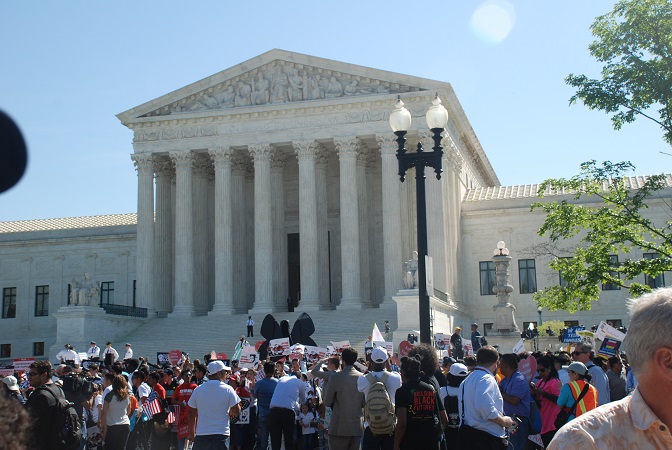The Supreme Court recently handed down a decision in United States v. Sineneng-Smith, reversing a Ninth Circuit decision that purported to invalidate the federal statute that makes it a crime to encourage illegal immigration.
Court commentators were quick to characterize the decision as a reversal “on a technicality” rather than “on the merits.” They also claimed that the decision leaves the possibility of the same issue being raised again before the high court in the future. However, neither of those characterizations is particularly accurate. Politico even went so far as to accuse the Court of deliberately sidestepping the salient issue.
This matter arose when Evelyn Sineneng-Smith, an immigration consultant, was charged with multiple violations of 8 U. S. C. §1324, which makes it a felony to “encourag[e]or induc[e]an alien to come to, enter, or reside” unlawfully in the United States. The statute also imposes an enhanced penalty if the crime is “done for the purpose of commercial advantage or private financial gain.”
At trial, Sineneng-Smith argued that the relevant provisions of 8 U. S. C. §1324 violated the Petition and Free Speech Clauses of the First Amendment. However, the District Court was unmoved by her defense and a federal jury found her guilty on all counts, as charged.
Sineneng-Smith filed an appeal with the intermediate appellate court, the Ninth Circuit Court of Appeals, which ruled in her favor. The Supreme Court reviewed the matter when the government appealed the Ninth Circuit’s decision.
A case is decided “on the merits” when the reviewing court directly addresses the legal question before it. In this case: Is the federal law criminalizing the act of encouraging or inducing illegal immigration for commercial advantage or private financial gain unconstitutional, pursuant to the terms of the First Amendment?
By contrast, a case is described as having been decided “on a technicality” when the reviewing court renders a decision on the basis of a procedural rule, which dictates how the court should determine facts, weigh evidence or apply the relevant law.
That is significant because appellate courts don’t, technically speaking, decide cases. Rather, they decide questions of law. And, often, procedural rules, dictating how a court approaches the question before it, will determine the answer to the question.
In this matter, the Ninth Circuit issued its decision based on arguments that were never made by the parties litigating this matter. Had it relied solely upon the arguments advanced by Sineneng-Smith and the government, the Ninth Circuit would have had no choice but to find that 8 U. S. C. §1324, like many other statutes that criminalize efforts to entice another to commit a crime, are not invalidated by the First Amendment. The Supreme Court’s decision is, in essence, a message to the Ninth Circuit saying, “You applied the wrong rules. That’s why you made the wrong decision.”
Characterizing this type of decision as a “ruling on a technicality” implies that the high court addressed some subsidiary issue with no direct effect on the constitutional question presented. It also sets up a false dichotomy between “unimportant” procedural rules and “important” rules like the First Amendment. But, in reality, procedural rules establish the means for enforcing rights and obtaining redress for violations of them. Without them, our substantive legal rights mean nothing.
Far from being an attempt to “punt,” the United States v. Sineneng-Smith forcefully addresses both the integrity of federal appellate court procedure and the integrity of the First Amendment. And if the Ninth Circuit receives the message sent by the Supreme Court, this issue should be fully and finally put to rest.





1 Comment
Pingback: SCOTUS: 9th Circuit Can’t Twist Law to De-Criminalize Aiding + Abetting Illegals – India Inc Blog